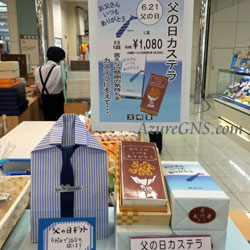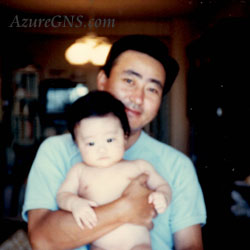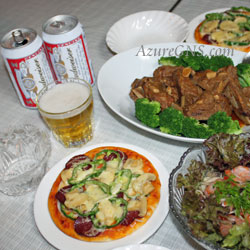(6月の第3日曜日)
Chichi-no-hi;
Father’s Day
(The third Sunday of June)
●父の日 Chichi-no-hi; Father’s Day
●父 father
●実父 biological father; one’s own real father
(ownは義父ではない、realは継父ではないことを表す。)
●継父 stepfather
●舅 father-in-law
●感謝 gratitude; thanks; appreciation
●敬愛 piety; love; reverence
●尊敬 respect; esteem
●プレゼント gift; present
●手紙 letter
●カード card
●ネクタイ tie; necktie
●酒; アルコール alcohol
●煙草 cigarette
◆日本の父の日はアメリカが起源と言われています。
The custom of Father’s Day in Japan is said to have come from the United States.
◆1908年、ワシントン州に住むソノラ・スマート・ドットさんが母の日の説教を聞いていました。
In 1908, Ms. Sonora Smart Dodd in Washington was listening to a sermon about Mother’s Day.
◆その時、母の日があるのに父の日が無いのはおかしいと思いました。
At that time, she thought it strange that there was a Mother’s Day, but not a Father’s Day.
◆ドットさんの父親のウイリアム・ジャクソン・スマート氏は南北戦争時代の北軍の軍人でした。
Ms. Dodd’s father, Mr. William Jackson Smart, was a soldier of the North during the Civil War.
◆父親が戦争に行っている間、母親が女手一つで男の子5人、女の子1人を働きながら育てました。
While her father was at war, her mother worked and raised five sons and one daughter.
◆母親は働き過ぎのため体を壊し、父親の復員後間も無くなくなりました。
Her mother passed away, due to being overworked, soon after her father was demobilized.
◆その後父親は生涯再婚もしないで、献身的に6人の子供を育てました。
After her mother’s death, her father didn’t remarry, and devotedly raised the six children.
◆彼女の父親は愛情豊かで、勇敢で、誰にも尊敬される人でした。
Her father was an affectionate and brave man, who was loved by everyone.
◆彼女が父の日を作って下さいと請願した7年後の1916年6月19日にワシントン州のスポーカンで父の日が誕生しました。
On July 19th of 1916, seven years after she had first petitioned to establish Father’s Day, it originated in Spokane, Washington.
◆やがて父の日はアメリカ中で祝われるようになりました。
Soon, Father’s Day came to be celebrated all over the United States.
◆1966年、ジョンソン大統領が日付を6月の第3日曜日と決定しました。
In 1966, President Johnson designated the third Sunday of June, as Father’s Day.
◆6月は彼女のおとうさんの誕生月でした。
Her father’s birthday was in June.
◆1972年、ニクソン大統領によって国民の祝日に制定されました。
In 1972, President Nixon declared Father’s Day a national holiday.
◆それは母の日が1914年に国民の祝日になった58年後でした。
This was 58 years after Mother’s Day had become a national holiday.
◆父の日はアメリカから日本に伝わり、一般に広まりました。
Father’s Day was introduced to Japan from the United States and has become very popular.
◆日本の父の日は6月の第3日曜日で、国民の祝日ではありません。
In Japan, Father’s Day falls on the third Sunday of June, but is not a national holiday.
◆父の日に贈り物はしますが、母の日のカーネーションの様な伝統的なプレゼントはありません。
Although gifts are given on Father’s Day, there are no traditional presents, such as carnations on Mother’s Day.
◆昔、日本の父親は家庭の大黒柱で、子供達は父親に畏敬の念を持っていました。
In the old days, Japanese fathers were the anchor of the family, and children feared and respected them.
◆しかし最近は家庭での存在感が薄い父親が増えているようです。
These days, however, more and more fathers tend to be overlooked by their families.
◆その原因のひとつは、日本のお父さんが子供と接する時間が他の国に比べて短いことのようです。
One of the reasons could be that fathers in Japan spend less time with their children than fathers in other countries.
◆世界各国にも父の日はありますが、その日付や祝い方は国によって様々です。
A lot of countries celebrate their own Father’s Day; however, when and how it is celebrated varies from country to country.
(より詳しい情報は「我が家の父の日」をご覧下さい。)
(Please see “My Father’s Day Experience” for further information.)
Copyright (C) Azure Global Network Services. All Rights Reserved.






